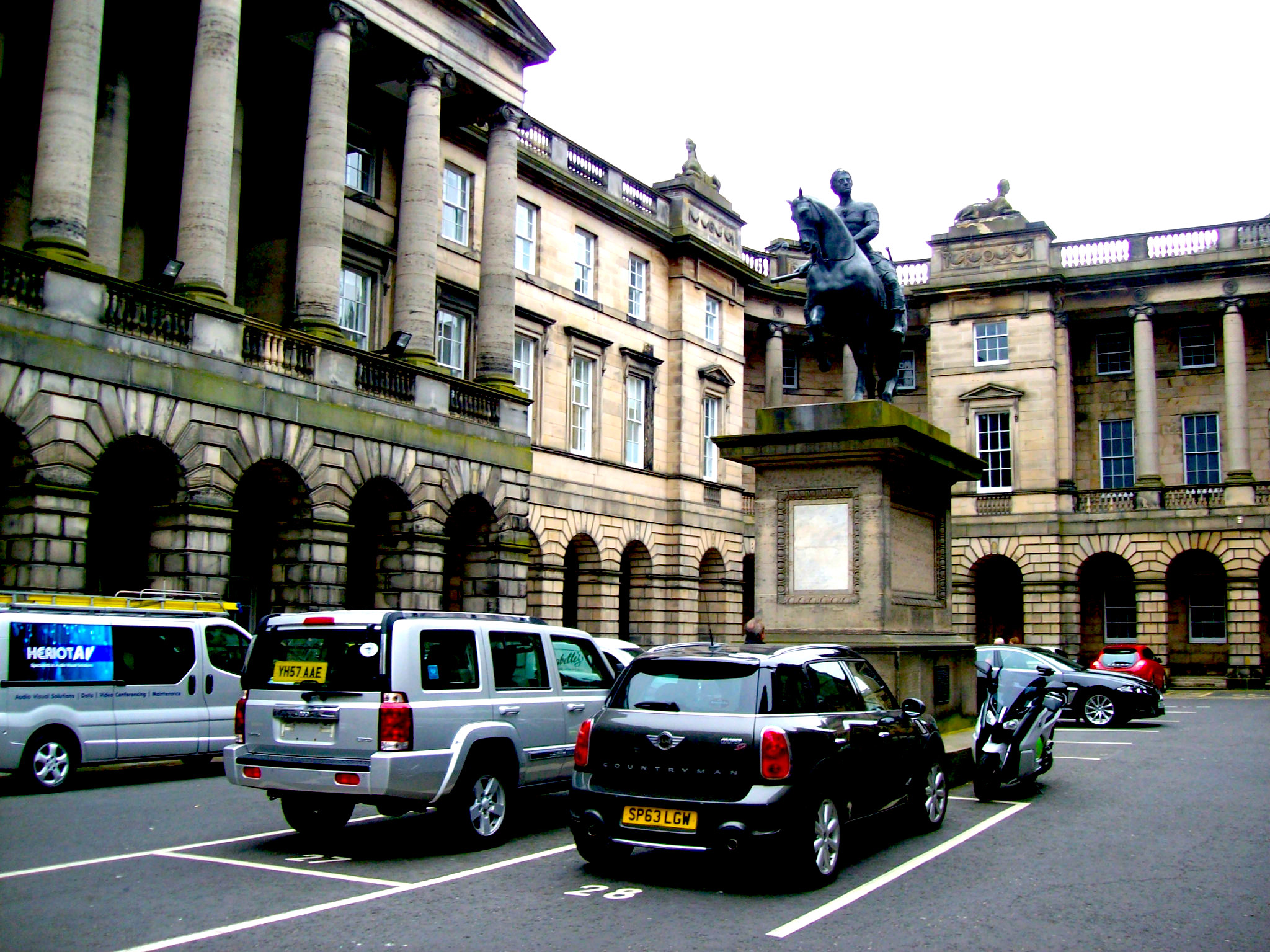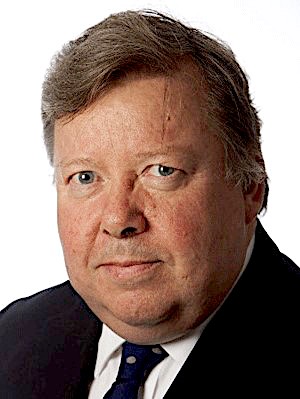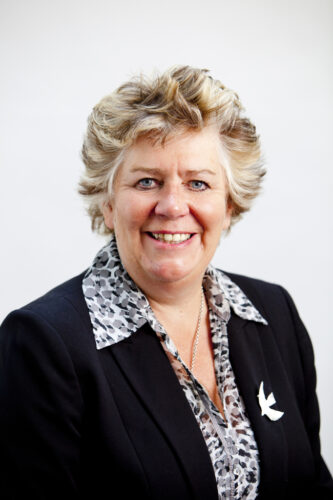On Wednesday Murray goes back to court to fight the potentially far-reaching legal distinction made in his case between “new media” and “mainstream media” and journalism’s liability to prosecution and imprisonment.

Parliament Square, Edinburgh, 2014; the Law Courts on left. (summonedbyfells, Flickr, CC BY 2.0)
By Craig Murray
CraigMurray.org.uk
 I will never get back the four months of my life I spent locked at least 22.5 hours a day in a 12-foot-by-8-foot cell. I have nothing personally to gain from carrying on the legal fight —I was a civil prisoner and do not have a criminal record.
I will never get back the four months of my life I spent locked at least 22.5 hours a day in a 12-foot-by-8-foot cell. I have nothing personally to gain from carrying on the legal fight —I was a civil prisoner and do not have a criminal record.
But the legal distinction made by Lady Dorrian’s judgement between “new media” and “mainstream media,” in terms of their liability to prosecution and to imprisonment, has to be fought, because coming from a three-judge bench of the High Court in Edinburgh it is a citable precedent throughout many English speaking jurisdictions (and is directly contrary to European Court of Human Rights rulings).
On Wednesday we appeal to the nobile officium, the Scottish appeal court of five High Court judges, where Lord President Carloway will hear the appeal. In pursuit of my commitment to open justice and to giving readers original sources so they can make up their own mind, I had intended to publish our submissions to the court here, but the legal team informs me I cannot in law do this until the court starts its hearing. So, watch this website on Wednesday.
However, what I can tell you is that a common theme emerges from the various points of appeal — the arbitrariness of Lady Dorrian’s proceedings. Consider these points, all part of my appeal:
1) Neither the Crown nor the Court ever suggested in the proceedings or papers, a distinction between “mainstream media” or “new media.” It was never put to us, so we could never argue against it. Lady Dorrian simply formed it in her head and then set it in stone. Had the distinction been put to us at the trial, we would have wished to bring forward expert witnesses to refute Lady Dorrian’s dicta that “mainstream media” is more ethical than “new media.” To introduce the distinction into law is deeply worrying. To do so without hearing arguments is extraordinary.

Colin John MacLean Sutherland/Lord Carloway, president of the Court of Session, 2021. (Judiciary of Scotland, Wikimedia Commons)
2) The majority of the “jigsaw clues” to identification found in Lady Dorrian’s judgement, were never in the accusation against me, so we had no opportunity to refute them in court. The Crown identified in its petition a number of phrases they claimed could be identifying, and we argued in submissions and in my affidavits that this was not so. But Lady Dorrian in her judgement came up with a number of new phrases she stated were identifying, but which proposition had never been put to me in proceedings and I had no idea were claimed to be identifying, until the judgement.
3) Lady Dorrian entirely discounted my affidavits as untruthful without ever putting that to me to give me a chance to respond. I submitted two detailed affidavits on oath setting out that it had never been my intention to disclose identities. I stated the steps I had taken to ensure I did not do so and how my precaution was greater than that of the mainstream media. My counsel informed the court that I was prepared to answer any questions on my affidavits, either from the Crown or from the Court. Both Crown and court declined to question me. The normal presumption is that if evidence is not challenged in court, it is accepted. To dismiss my affidavits with no cross-examination is extraordinary.
4) Lady Dorrian had based her substantial prison sentence on her judgement that I had “relished” giving clues to identity. This had not been alleged by the Crown, the court had heard no evidence from anybody to this effect, and it was directly contrary to my own unchallenged evidence on oath.
5) It is impossible for the journalist to know exactly where the line lies for “jigsaw identification.” My article of March 11, 2021, for example, consisted entirely of material gleaned from mainstream media as I was not in court nor yet had my own sources in court on that day, yet I was found in contempt for publishing nothing but what the mainstream media had already published.
This is all remarkably arbitrary, in the most literal sense.

Leeona June Dorrian/Lady Dorrian, 2016. (Court of Session, Wikimedia Commons)
These are points of process. The more fundamental point is that I, as a journalist, had access to both written and eye-witness evidence that led me to believe that the current first minister of Scotland was orchestrating a plot to frame the former first minister of Scotland on entirely false charges: a belief of which I am now quite certain. This was a matter of the highest possible public interest leading to an overwhelming Article 10 to European Court of Human Rights right to publish. I realized that right was in conflict with the Article 8 right of the accusers to the privacy ordered by the court, and I did my best to balance the two (even when I was publishing articles on the plot for eight months before there was a court order in place protecting identities).
However, Lady Dorrian gave no weight whatsoever to the Article 10 Freedom of Speech side of this equation. This was worsened by the fact that the Crown held the documents which I had seen which convinced me of the plot against former First Minister Alex Salmond, many of which are still not public, and the court refused my application for their disclosure, so I could assert the reasonable grounds for my belief in the plot against Salmond.
The current situation is that Wednesday’s appeal will be held with no public gallery and no streaming or dial-in access. I have asked my legal team to object to this, and will keep you posted. I am frankly furious that the public will be kept away from the hearing.
I am afraid that I am going to have to renew my appeal for funds to help with the legal costs. Fighting these kinds of actions is simply crippling. Your dedication to freedom and your support have so far saved me from personal bankruptcy, but we now need to raise a further £80,000 immediately.
Craig Murray is an author, broadcaster and human rights activist. He was British ambassador to Uzbekistan from August 2002 to October 2004 and rector of the University of Dundee from 2007 to 2010. His coverage is entirely dependent on reader support. Subscriptions to keep this blog going are gratefully received.
This article is from CraigMurray.org.uk.
The views expressed are solely those of the author and may or may not reflect those of Consortium News.

Aside from the differentiation of “new media” from “mainstream media”, why in the hell should the government have the power to decide what is “media” and what is not?
They should not, pure and simply.
To give them that power, enables them to define anything as they wish.
And we know where that will take us.
Reality: that which does not change in spite of determination to make it otherwise by aspiration, effort, hope, and faith.
We only think we know how far gone from us as citizens are our guidepost institutions by which we measure our own enfranchisement and agency vs the blunt and immovable power of the state with its insensate (lacking physical sensation, lacking sympathy or compassion, completely lacking sense or reason.)
I can only imagine how much angst and sense of betrayal of values Ambassador Murray has had to undergo since he chose the path of honor and righteousness while still serving in the UK’s Foreign Office and finding his superiors in London were condoning the beyond barbaric torture he witnessed in his last post.
He was offered the plum post of Ambassador to Denmark if only he would just forget about what he knew to be true and what was so antithetical to his personal core being. And that for which he believed his country stood for steadfastly. But the cloak came off, the veil was lifted, and he found himself suddenly an outsider, a stranger in a strange land. By choosing the moral high ground.
Stripped of his honors (but not his honor and integrity,) he has applied himself again and again courageously against the juggernaut by joining the rebel forces of the idealists left among us; even as scores of the many former upholders of our values fell by the wayside, seduced by the power and the lucre, or in many cases, by intimidation, by outright threats.
This is the new Law of the Land, built upon the ash heaps of western democracies as their principles have been deconstructed and unraveled, a once semi-solid rope now but weakened strands snapping one by one. Into the breech, the vacuum, comes the craven poorly-legislated, if legislated at all, the covertly codified assertion of the state’s primacy as ‘Protector’ against an inchoate and amorphous unanswerable thing, a blob called “The War on Terror.”
Whatever form it takes, whatever it takes to own the field, keeping the population fearful has become the standard by which we are expected to exist—even as any notion of opportunities and “To promote the general welfare” have been subsumed into the already over-brimming coffers of those who would be king(s.) And these kings find Mr Murray more than a thorn in their side. He along with the remaining courageous few has stood firmly for Julian Assange, the symbol of all who yet resist, the most dangerous man in the world to all the kings’ plans.
So he has been singled out for punishment, and like Craig subject to show trials of bramble thickets of obfuscations and such “points of law” that are not worthy of argument, for indeed their only purpose is to obscure and elongate the time passing with no resolution being the object of it all. The System has all of us wrapped around its axle as its agents pontificate of matters high and mighty—but ultimately absurd. Craig knows this. We know this. But it remains the only ‘legal’ avenue of recourse available to us and as he mentions, it is very, very costly to pursue vindication and even a modicum of justice in this rigged-for-the-rich System. A trap, both physical and mental.
We are living what the prophets of the 19th and 20th centuries foresaw. Lewis Carroll, Aldous Huxley, Franz Kafka and so many more stand preeminent in all that we see when we “Question Authority!” Such is our lot in these conditions so well-established—by the Establishment.
Thanx Craig Murray 4 your sacrifice & CN 4 following an ultra important story.
Of 1/2 Scots heritage myself, always took pride in the independance earned by my forebearers…
Can only speculate that such egregious injustice a sign of our times…
As progressive change (badly needed) seems to be in the future the mainstream holds on with increasing desperation.
BEST WISHES…SIR!
Is judicial bias corruption or is she just incompetent or unqualified?
Transparency International deal with this sort of thing.
could they be useful?
Pacific chapters and Transparency International call for democracy strengthening efforts across the region as US visits Pacific chapters and Transparency International.
10 February 2022